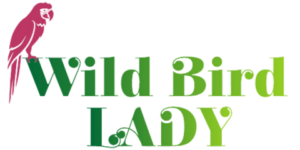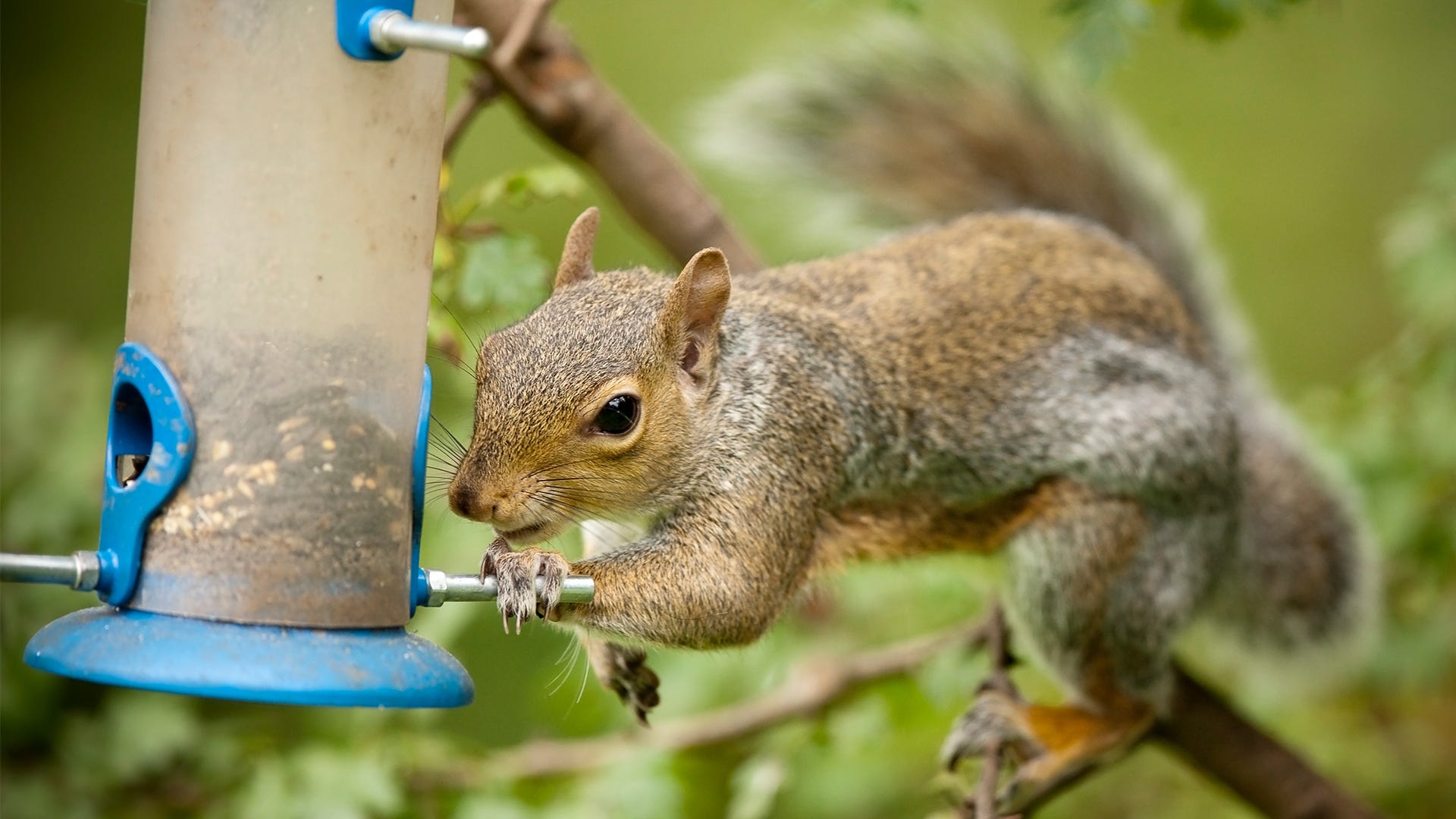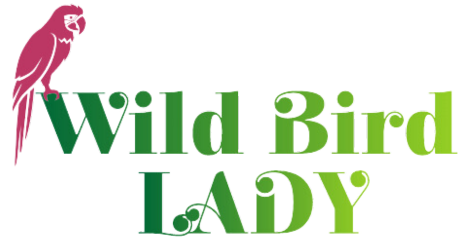To prevent squirrels from climbing your bird feeder pole, use squirrel baffles and slippery poles. Here are ten effective ways to keep squirrels from stealing bird food and damaging bird feeders.
Bird watching is a calming and tranquil hobby, but the peace can quickly be shattered by pesky squirrels that attack bird feeders. Not only do squirrels eat all the bird seed, but they also chew through the bird feeders. Whether you’re a garden lover or simply enjoy bird watching, understanding the right squirrel deterrents effectively save the food and your feeders.
This article lists ten effective ways to keep squirrels off your bird feeder pole, including hardware stores, slippery poles, squirrel baffles, and repellents. With these methods, you’ll be able to block squirrels, maintaining a peaceful environment for your feathered friends.

Credit: www.bobvila.com
Understanding Squirrels
The Habits And Behavior Of Squirrels That Make Them A Threat To Bird Feeders
Squirrels are excellent climbers, runners, and jumpers, making them natural predators of bird feeders. Here are some key points about their habits and behaviors that make them a nuisance to your bird feeder:
- Squirrels are diurnal (active during the day) creatures and mostly forage in the morning and late afternoon.
- They have exceptional balance, allowing them to climb up and down the pole with ease.
- Squirrels can jump up to 10 feet horizontally and four feet vertically, and can leap from the trees to the bird feeders.
- They are adaptable creatures and can learn how to overcome different bird feeder designs and barriers.
Characteristics And Anatomy Of Squirrels That Make Them Well-Equipped To Raid Bird Feeders
Squirrels are incredibly agile creatures that have several physical characteristics that makes them well-suited to raid bird feeders. Here are some key points about their characteristics and anatomy that contribute to their success:
- Squirrels have sharp claws that can grip onto any surface, including metal, plastic, or wood poles.
- Their teeth are long, sharp, and constantly-growing enabling them to chew through a variety of materials – even the most challenging bird feeders.
- They have excellent vision, allowing them to spot bird feeders from far away.
- The bushy tail of squirrels serves as a counterbalance while running or jumping, which helps them climb more precisely.
How Squirrels Learn From Their Experiences And How That Could Affect Your Bird Feeder
Squirrels are smart, curious animals that can learn from their experiences and apply that knowledge to overcome bird feeders. Here are some key points about their ability to learn from their experiences and how you can prevent this from affecting your bird feeder:
- Squirrels will return to a location where they know they can find food, even if their past attempts have been thwarted.
- They can learn how to solve puzzles and overcome barriers, such as climbing poles or avoiding sticky surfaces.
- Squirrels can observe and copy other squirrels’ success in raiding bird feeders.
- They have excellent memory and can remember bird feeder locations.
To prevent squirrels from climbing your bird feeder pole, it’s essential to understand their behavior, characteristics, and how they learn from their experiences. Implementing squirrel-proofing solutions, such as squirrel baffles or specialized feeders, can also help keep these pesky creatures from raiding your bird feeders.
Prevention Through Preparation
Positioning Your Bird Feeder In An Ideal Location To Avoid Squirrels
When it comes to preventing squirrels from eating the food intended for the birds, one of the most effective ways is choosing the right location for your bird feeder. Here are some tips:
- Choose a spot that is at least 10 feet away from any trees, so squirrels cannot jump onto the feeder.
- Make sure the feeder is at least 5 feet above the ground and 10-12 feet away from the nearest tree trunk or structure.
- Place the feeder on a pole that is coated with a lubricant, such as petroleum jelly, to make it difficult for squirrels to climb up.
The Use Of Squirrel-Proof Feeders And Deterrents
Squirrel-proof feeders and deterrents are another effective way of keeping squirrels away from bird feeders. Here are some options:
- Dome-shaped feeders with a weight-activated perch that shuts the feeding ports when a squirrel tries to access them.
- Caged feeders with metal wiring around them, allowing birds to enter but deterring squirrels from accessing the food.
- Baffles, which are cone or dome-shaped devices placed above or below the feeder to keep squirrels from climbing up the pole or jumping down from above.
- Ultrasonic and chemical deterrents that emit sounds, smells, or tastes that squirrels find unpleasant.
Discussion Of Different Types Of Squirrel-Proof Feeders And How They Work
Squirrel-proof feeders come in various shapes and sizes and work in different ways to keep squirrels out. Here are some examples:
- Weight-activated feeders use a spring-operated mechanism to close the feeding ports when a squirrel steps on the perch, but will open again when the squirrel’s weight is removed.
- Baffle-style feeders have a cone- or dome-shaped device that surrounds the feeder, making it difficult for squirrels to reach the food.
- Caged feeders have wire cages that surround the feeder, allowing small birds to enter through the spaces between the wires, but keeping larger animals such as squirrels out.
Tips On Making Homemade Squirrel-Proof Feeders
If you’re feeling crafty, you can make your own squirrel-proof bird feeders using materials that you may already have at home. Here are some tips for making your own squirrel-proof bird feeders:
- Use a large plastic bottle with feeding ports cut into it and attach it to a pole or branch, surrounding it with a cone-shaped baffle.
- Create a small, cage-like structure around the feeder using chicken wire or metal screen.
- Add cayenne pepper or other spices to the birdseed to make it unappetizing to squirrels.
Discussion Of Other Types Of Squirrel Deterrents, Such As Chemicals And Electronic Devices
There are many types of squirrel deterrents available on the market that use chemicals or electronic mechanisms to keep squirrels away from bird feeders. Here are some examples:
- Repellent sprays that use capsaicin, a chemical derived from chili peppers, to make bird food unpleasant for squirrels.
- Ultrasonic devices that emit high-frequency sound waves to scare away squirrels.
- Motion-activated sprinklers that spray water when a squirrel approaches the bird feeder.
Ensuring That The Bird Feeder Is Easily Accessible For Birds But Difficult For Squirrels
To make sure birds can easily access the feeder, but squirrels cannot, bird owners need to be careful about how they position, attach, and maintain their bird feeders. Here are some tips:
- Keep the feeder well-stocked to ensure that birds can feed without having to land on the ground.
- Adjust the feeder height and placement regularly to make it more difficult for squirrels to climb up.
- Trim tree branches that are close to the feeder to keep squirrels from jumping onto it.
Proper Spacing From Surrounding Trees Or Structures That Squirrels Could Jump From
It’s important to keep surrounding trees and structures at a safe distance to prevent squirrels from jumping onto the bird feeder. Here’s what you can do:
- Place the feeder at least 10 feet away from any trees.
- Trim branches that overhang the feeder, keeping them at least 5 feet away.
- Mount the feeder on a pole or hook at least 5 feet away from any walls or other structures.
Tips On Creating Barriers Around The Feeder
Creating barriers around the feeder can be an effective way of keeping squirrels away while allowing birds to feed. Here are some tips:
- Use a physical barrier such as a cone or dome-shaped baffle to prevent squirrels from climbing up to the feeder.
- Use pvc pipe or metal sheeting to create a cone around the feeder, or place a tray of grease or petroleum jelly at the base of the feeder pole to make it slippery for squirrels.
- Surround the feeder with a layer of wire mesh or chicken wire to keep squirrels out.
Remember, squirrels are persistent and agile creatures that will stop at nothing to reach their goal. With these tips and tricks, you can protect the bird food and enjoy watching birds as they feed.
Natural Squirrel Deterrents
Incorporating Natural Deterrents Into The Surrounding Environment
Squirrels can be pesky creatures when it comes to bird feeders, but there are plenty of natural ways to keep them at bay. Here are some tips for incorporating natural deterrents into your surroundings:
- Create a barrier using chicken wire around the base of your bird feeder pole.
- Plant prickly, thorny, or smelly plants and herbs around the base of the pole, such as rose bushes, lavender, or mint. Squirrels dislike these scents and feel uncomfortable with prickly bushes.
- Spread a thin layer of cayenne pepper around the base of the pole. The spice will deter squirrels and prevent them from climbing up to the feeder.
Discussion Of Plants And Trees That Naturally Repel Squirrels
Certain plants and trees can act as a natural deterrent to squirrels. Consider planting the following around your bird feeder:
- Peppermint: Squirrels dislike the smell of peppermint, making it a great plant to repel them. Plus, it smells wonderful and can enhance your garden.
- Daffodils: These beautiful flowers contain a toxic compound known as lycorine, which squirrels avoid.
- Marigold: Marigolds deter squirrels with their strong scent, as well as their bright colors and spiky foliage.
- Osage orange: This tree produces a fruit known as a hedge apple or monkey ball, which contains a natural compound that is toxic to squirrels.
How Predator Decoys Can Deter Squirrels From Approaching The Bird Feeder
Predator decoys are a great way to deter squirrels from approaching your bird feeder. Here are some tips on using them effectively:
- Place a decoy near your bird feeder, such as a fake owl or snake. The sight of a predator will scare squirrels away.
- Move the decoy frequently to make it appear more realistic.
- Consider positioning the decoy in a different location each day to prevent squirrels from getting used to it.
Tips On Using Scent Repellents As Natural Deterrents
Scent repellents can be an effective way to keep squirrels away from your bird feeder. Here are some tips on using them:
- Apply a small amount of peppermint oil or vinegar to a cloth or cotton ball and place it near the bird feeder. Squirrels will avoid the scent and stay away.
- Use a garlic or hot pepper spray to create an unpleasant scent for squirrels.
- Avoid using mothballs or other toxic repellents, as they can harm wildlife and are not environmentally friendly.
How To Deal With Persistent Squirrels
Methods For Trapping And Relocating Squirrels
If you’ve tried other ways to deter squirrels from your bird feeder pole and they continue to cause havoc on your bird food, trapping and relocating them may be the most viable option. Here are some methods to consider:
- Live traps designed for capturing squirrels can be purchased online or in-store. Follow manufacturer instructions when setting up the trap and place it close to the bird feeder pole.
- Check the trap regularly, preferably every 2-3 hours, to avoid risks of dehydration, starvation, or overheating.
- Once you’ve trapped the squirrel, relocate it at least 5 miles away from your home. Identify an area where the squirrel can thrive without interfering with people or other animals.
Discussion Of Humane And Ethical Ways Of Capturing Squirrels
While trapping and relocating squirrels can be effective, it’s essential to do it humanely. Here are some tips for ethical trapping:
- Choose live traps that don’t hurt the squirrel. Humane traps are designed to capture squirrels without any injury or harm.
- Avoid using lethal traps, as they can cause unnecessary pain and suffering.
- Place the trap in a shaded location to protect the squirrel from heat exposure.
Tips On Releasing Squirrels In A Suitable Habitat
After trapping squirrels, it’s crucial to release them into a suitable habitat where they can thrive and live comfortably. Follow these tips when releasing the squirrels:
- Find a wild habitat that is suitable for squirrels and far from human activities such as parks, forests, or reserves.
- Choose a location with adequate food, water, and shelter.
- When releasing the squirrel, set the trap door to the open position and let it walk out. It may take a few minutes for the squirrel to exit the trap, so be patient.
Disincentivizing Squirrels Through Alternative Food Sources
If you want an effective way to deter squirrels from your bird feeder pole, try providing them with alternative food sources. Here’s what you can do:
- Place squirrel-friendly bird feeders away from the bird feeder pole to attract squirrels.
- Provide food that squirrels prefer, such as corn, peanuts, sunflower seeds, and fruits.
- Incorporate obstacles that only squirrels can overcome, such as a squirrel feeder that denies access to other animals.
Listing Of Food That Squirrels May Prefer Over Bird Food
Squirrels are known to prefer some foods over bird foods. Here are some examples:
- Corn – squirrels love corn on the cob.
- Peanuts – try hanging peanut-filled feeders farther away from the bird feeder.
- Sunflower seeds – they’re a favorite among squirrels.
- Fruits – squirrels love fruits such as apples, mangos, and bananas.
Tips On How To Incorporate Alternative Food Different Bait Points Around
To reduce squirrels’ attention on your bird feeder, you need to set alternative food sources in different feeding stations. Here are a few tips:
- Hang squirrel feeders away from the bird feeder and elevate it to avoid easy access by other animals.
- Use baffles or guards around feeding stations to prevent food from dropping onto the ground.
- Keep an eye on the feeding stock and replace empty containers regularly.
Seeking The Help Of Professionals Or Research Institutions
In case trapping squirrels or disincentivizing them doesn’t work, you can seek professional help from local animal control services or wildlife research institutions. Such professionals can offer customized pest control advisory services and help you come up with long-term solutions.
Remember to do due diligence and choose licensed professionals with knowledge and experience in wildlife management.
Managing squirrels around bird feeders can be demanding, but with these tips, you can find suitable and humane solutions that enable both birds and squirrels to coexist.
Frequently Asked Questions For 10 Effective Ways To Keep Squirrels From Climbing Your Bird Feeder Pole
How Can I Keep Squirrels Away From My Bird Feeder Pole?
You can keep squirrels away from your bird feeder pole by using squirrel-proof feeders, greasing the pole, installing a squirrel baffle or dome, and using spicy substances like cayenne pepper or hot sauce.
Do Mothballs Keep Squirrels Away From Bird Feeders?
Mothballs can be used to keep squirrels away from bird feeders. However, they are toxic and might harm wildlife and pets. Using safe alternatives like cayenne pepper or hot sauce is recommended.
Can I Use A Pvc Pipe To Keep Squirrels From Climbing My Bird Feeder Pole?
Yes, using a pvc pipe is an effective way to keep squirrels from climbing your bird feeder pole. Cut a pvc pipe to the length of the pole, slice it lengthwise, and wrap it around the pole. The slippery surface keeps squirrels from climbing up.
Conclusion
After going through these 10 effective ways to keep squirrels from climbing your bird feeder pole, it is evident that there are numerous tested and proven methods to deal with this issue. Whether you opt for baffles, squirrel proof bird feeders, or even creating a separate feeding station for squirrels, the end goal is to ensure that your feathered friends have a peaceful and secure feeding environment.
It is essential to stay vigilant and regularly check your bird feeders to make sure that the prevention tactics are still effective. With these tips in mind, you can enjoy watching birds without worrying about pesky squirrels interrupting the peace and quiet.
So, take action and start implementing these strategies to keep squirrels away from your bird feeders, and enjoy an uninterrupted view of your feathered friends.
Latest Posts
The Ultimate List: Top 8 Best Birdwatching Podcasts for Avid Birders
Looking for the top birdwatching podcasts? Here are the eight best options to tune into today! Birdwatching can be a thrilling, immersive experience that brings...
Discover the Top 14 Stunning Hawk Migration Sites in Massachusetts
Massachusetts has 14 breathtaking hawk migration sites, offering bird lovers some of the best viewing opportunities in the country. Are you a bird lover looking for an exciting way to get out and...


